Taking the Lead
portrait by Todd France
portrait by Todd France
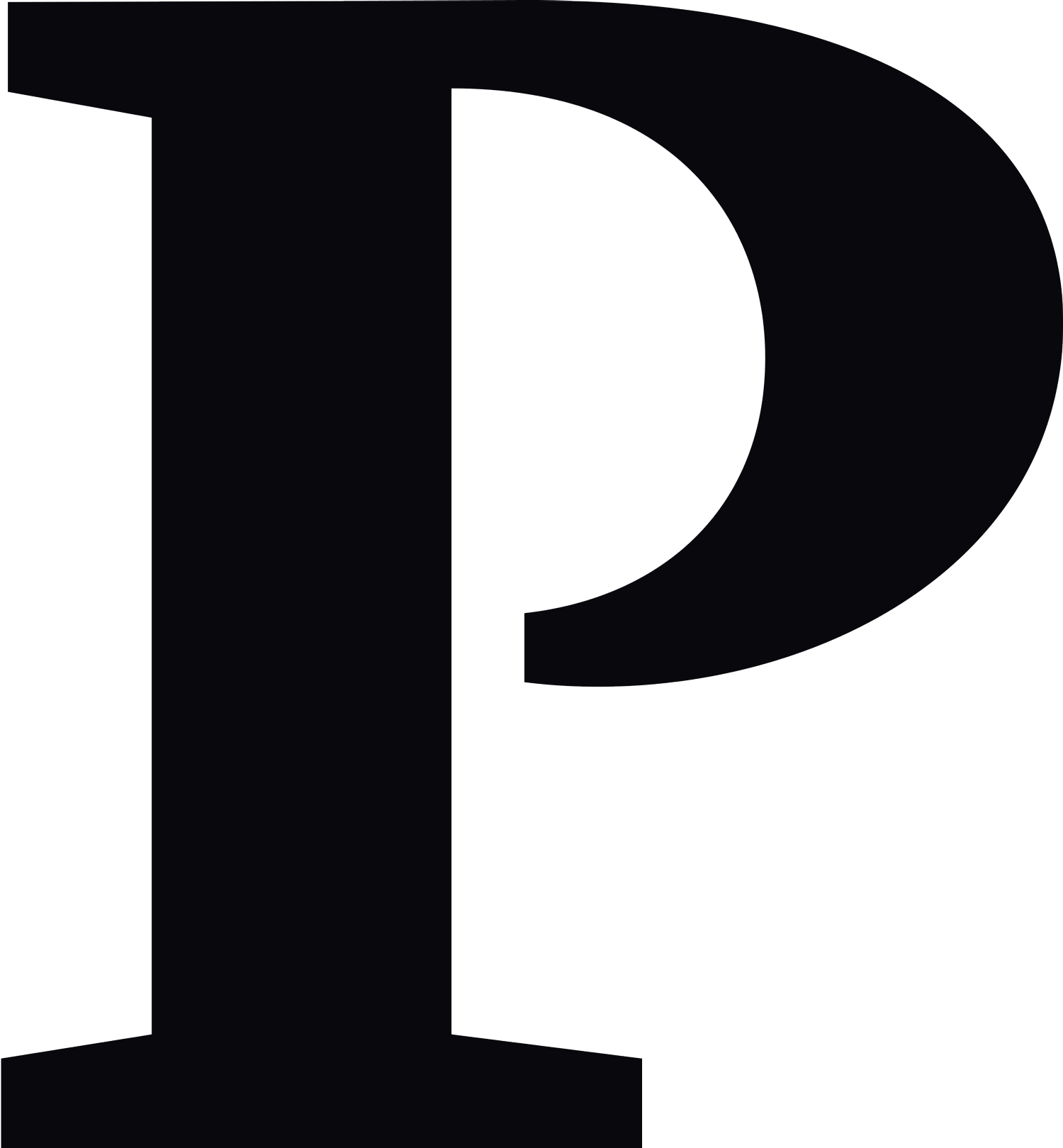
Some of the things that drew him to Brooklyn Law School, where he previously taught as a visiting professor, were its inclusive mission, which aligns with his passion for promoting access to legal education, and its progressive ethos, which he summed up in his Convocation speech:
“By embracing talent and ambition that had been turned away elsewhere, Brooklyn Law School has been a beacon of excellence and an engine of social mobility and transformation for generations of our graduates and their families, but also for the clients and the communities they have gone to serve, oftentimes communities that were not well represented by access to the justice system,” Meyer told students. “So I welcome you to the adventure ahead.”
He talked about his own adventure in an interview with Brooklyn Law Notes.

Our time here at Brooklyn Law School left a powerful impression on us, both professionally and personally. We were so impressed at the distinctive strengths of the faculty and the students. For example, I taught both the regular Family Law course and a seminar on issues relating to parents and children and state authority, and I was amazed that the seminar class included students who were longtime veteran child-welfare caseworkers, people working in the juvenile justice system, and others who had law enforcement experience. It just made classroom discussions so much richer, to draw on the student experience and expertise represented. That sort of exceptional quality is something that you do not find at most other law schools. The faculty is so strong as both scholars and teachers, and it was very exciting to be a part of this community. Finally, of course, Brooklyn itself was and is so vibrant and creative—and that made being here professionally as a teacher and scholar even richer and more exciting.
What inspired you to become a lawyer?
My family moved to Tallahassee, Fla., from the college town of Grinnell, Iowa, when I was in first grade, just as Tallahassee was really getting serious about desegregating the schools. I attended a new school designed to be a magnet school. This was very much a time when my mom was politically active and involved with civil rights and social justice issues, and for me as a child it was an awakening to the profound issues of inequality and injustice. That was really the origin of my interest in the role that lawyers have in addressing those problems and where I first started getting the idea of wanting to be a lawyer.
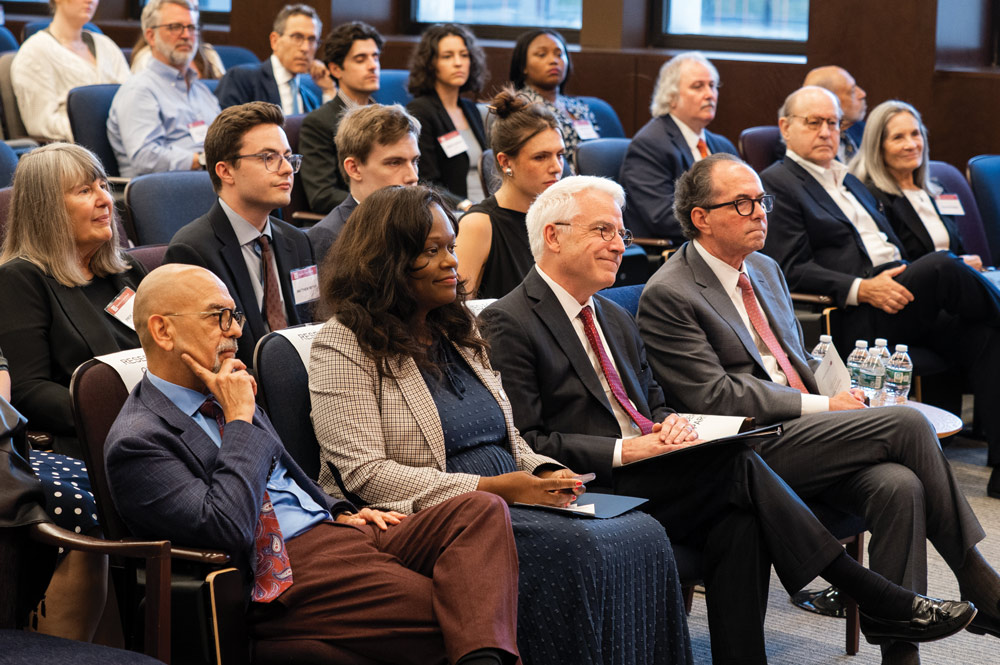
One early discovery or impression I had was that it made me really appreciate the profound impact that individual lawyers can have, the difference in outcomes. Once I was a law clerk on the inside of a court and seeing how decisions were made, I saw the impact that high-quality lawyers could have on the outcome of a case. And, likewise, the impact of less-qualified lawyers. I was naive in coming in to be a law clerk and thinking that all lawyers came from law school and were trained, and I quickly discovered by reading the briefs and seeing the arguments of real lawyers for the first time that there is a wide range of lawyers. It made me also realize the importance that legal education can have in preparing lawyers to really be excellent advocates for their clients. It made me see, with my own eyes, the profound impact that courts and the justice system have on the lives of people and in business. And in every realm where courts have a significant role, whether that was when I was clerking at the Supreme Court and being involved for the first time in capital cases through stays of execution, or in cases involving families and businesses where people or parties saw their livelihoods or futures resting on the outcome of a legal decision.
Did that lead to your scholarly focus on family and constitutional law?
I was interested in the overlap between family law and constitutional law. There’s a surprising and growing overlap between the two fields, and the Supreme Court has understood the Constitution to recognize a number of rights of individuals relating to family. The most obvious example to come before the court is rights of marriage, but also [rights] relating to parenthood, child-rearing authority, education, and other issues that touch families. Those issues were deeply interesting to me, from a perspective of families and policy relating to families, but also as a matter of constitutional theory, because many of these issues go to the deepest questions of constitutional interpretation and theory, such as the right to privacy, which is obviously much debated on the court.
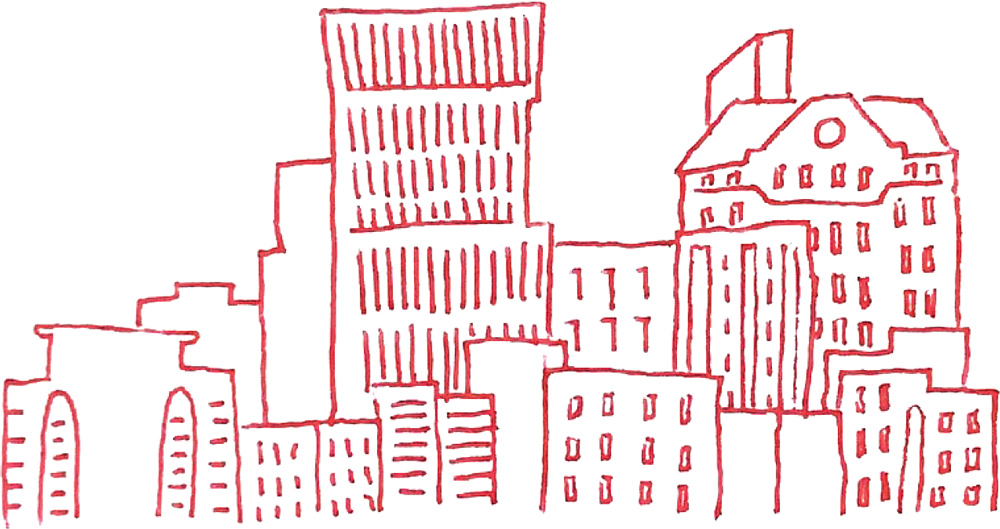
I am very excited about Brooklyn Law School, both where we are as an institution right now and the opportunities that are ahead of us. The school has a rare combination of assets that set it apart from other law schools. We’re also at a particular moment in our history when there is a real opportunity for change and advancement.
The priorities that I would see are, number one, to strengthen support for the faculty, because this extraordinary faculty is our leading asset as an institution and doing an amazing job, but they need additional support to unleash the school’s full impact on the world. Number two, and relating to that, is to leverage the strength of our clinical and experiential learning programs to enhance hands-on educational opportunities and the impact on the larger community. The clinics are, of course, an incredible asset for Brooklyn Law School, and they have never been more vital in legal education, for the training of students and for the important role that law schools play as community partners.
A third urgent short- and long-term priority is to revitalize the student experience and to support stronger student outcomes, in terms of both bar passage and job placement. We have already made progress, but it’s time to bring back the historically strong and vibrant sense of community that has defined Brooklyn Law School. Another priority is expanding our partnership with alumni in all of our ambitions. The future of legal education increasingly requires not only the classical model of law school education, where scholars are teaching students in the classroom, but also a model in which students gain knowledge outside the classroom. Much of that comes from the partnership with alumni through mentoring, teaching, hiring, and philanthropy. Innovative programs like the Business Boot Camp are a perfect model for the kinds of partnerships that powerfully enhance student learning and career opportunities.
How can Brooklyn Law School bolster its current efforts to raise the bar exam passage rate?
Raising the bar passage rate requires working on multiple fronts, from admissions, to the curriculum, to academic support programs, to mentoring and experiential opportunities for students, to summer employment opportunities. All of these things end up feeding into student success on the bar. Brooklyn has already been taking admirable steps to increase support on each of those fronts. And we need to double down on all of it.
What was an innovation at Tulane that you thought was especially effective during your deanship?
Along the same lines as Brooklyn’s Business Boot Camp, one of the things that we did there back in 2011 was what Tulane called a Lawyering Skills Boot Camp that had several practice tracks: a criminal practice track, a civil litigation practice track, and a transactional track. It was a weeklong intensive simulation of law practice taught by alumni, principally, who came back from all over the country to New Orleans to teach, and it was meant to simulate for students that sort of high-pressure, intensive environment of being a young lawyer working on a vital matter. It included meeting the client, working through a transaction to closing at the end of the week, or arguing in front of a judge with the criminal or civil tracks. It was similar to Brooklyn’s model. It was this partnership with people who really were at the top of their game, and who could teach students in ways that traditional legal scholars can’t.
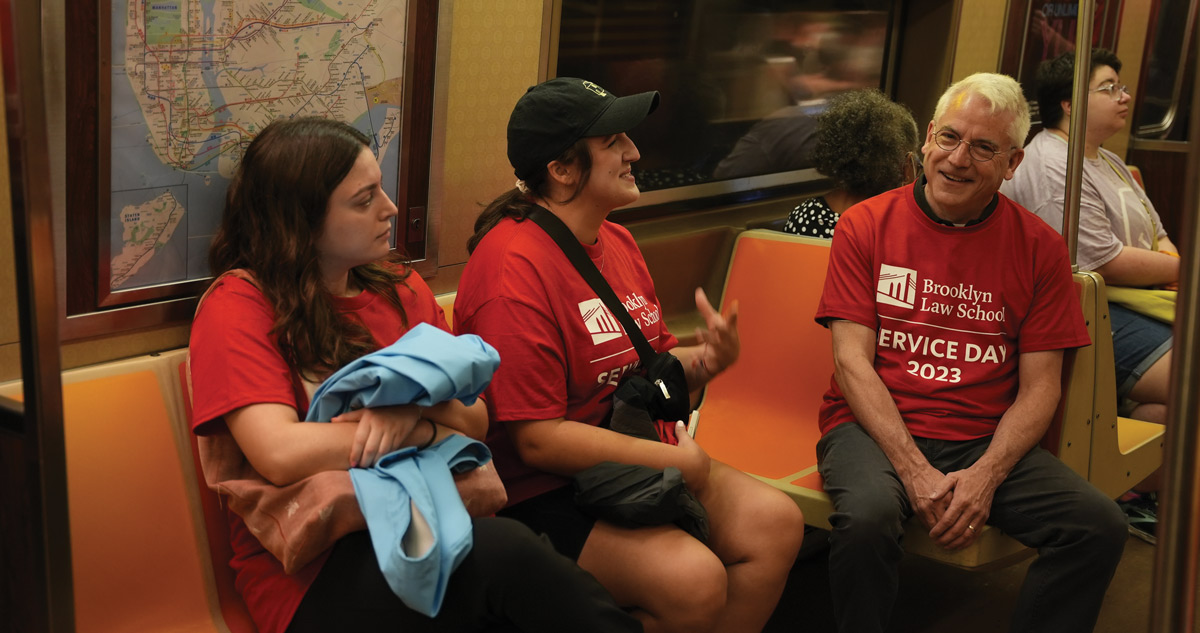
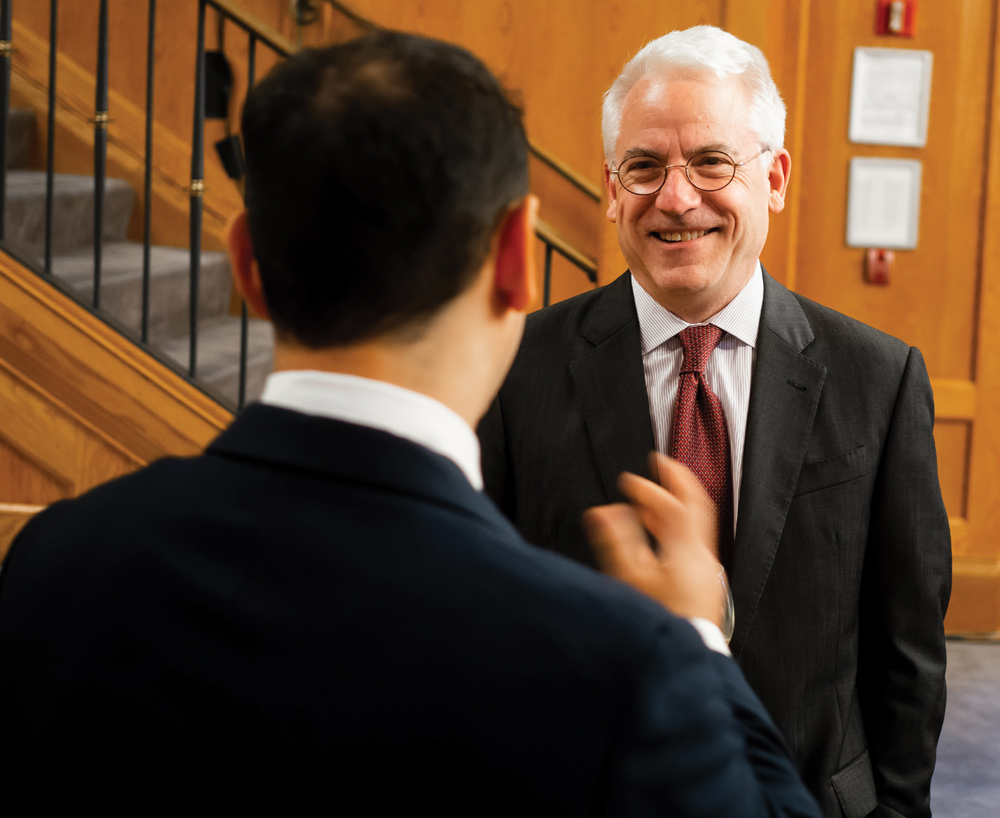
We must take the rankings seriously, because they bite us and they have consequences, so we can’t ignore them. At the same time, I think they have done terrible harm to legal education and to the interests of students and the profession. I’m committed to not participating in the rankings, and I agree with what [Professor] Michael Cahill did this past year [as dean]. We also need to convey the message to alumni and students and others who are anxious about the drop in the rankings this year that we get it. The things that will ultimately move Brooklyn Law School up in the rankings are things that we do care about, for the right reasons, not because of U.S. News, but because they relate to the welfare of our students. We want our students to pass the bar, we want them to land good jobs, and we want a faculty who are having exceptional impact through their scholarship and reputation. So those are all things we want, and we’ll continue to pursue those goals full throttle.
You issued a statement of disagreement after a recent Supreme Court ruling struck down affirmative action in higher education. What impact will the ruling have on the school?
It is a very important moment, not only for law schools, but also for the future of the country. As I wrote in the statement, the Supreme Court has always recognized that law schools play a special role in preparing future generations of leaders, not just in law practice but in government and business, higher education, and public service. Ensuring that law schools are open to the full range of talent in this country and beyond is essential to maximizing the quality of future leadership in this country. So, in recognizing the limits that the Supreme Court’s decision imposes, we cannot miss a step in our continuing commitment to access and for the full range of different leadership.
That, of course, goes to one of the reasons I’m most excited about being in Brooklyn, which is this proud and distinctive tradition that Brooklyn Law School has, going back to its founding, as an institution committed to open access for people with all backgrounds and ambitions. I’m just incredibly honored to be meeting our alumni and hearing the stories of families who have been touched and transformed by Brooklyn Law School, through the generations. So being true to that tradition is absolutely essential, not just for Brooklyn Law School, but for the benefit of society. We can certainly comply with the court’s decision fully while continuing to value access for students from all backgrounds.

Brooklyn Law School has this unique combination of qualities as an institution, combining access and openness with high ambition in a way that produces an exceptional quality of lawyers. In the heart of the world’s most vibrant, creative city there are certainly other law schools, such as Columbia and NYU, that are ambitious and excellent, but they do not have the same history and central commitment to access that Brooklyn has. There are other law schools within New York that have broad traditions of access but don’t have quite the same qualities of ambition and the excellence that Brooklyn has. That puts us in a unique spot, being a place that welcomes highly driven, hardworking people from wildly diverse backgrounds, who aspire to leadership at the highest levels of law practice as well as government and business and social justice.
Can you talk a little bit more about how we should position ourselves on a national level versus a regional level?
We are an independent law school and not part of a broader university, and that does set us apart nationally. I think that is an asset to us, because we’re an institution that is focused exclusively on preparing lawyers for diverse pathways of leadership in society. And we have the privilege of just focusing on our own defining mission of excellence in the legal profession.
What opportunities to specialize in different areas of the law benefit our students?
A wonderful thing about law school, generally, is that you don’t have to know exactly what you want to do when you come in, and you can discover your path as a student. What is different about Brooklyn is that you are engaging in that kind of discovery in an environment where the pools of opportunity to pursue your interests are deeper than anywhere else on the planet. Think about not only the strength of our own faculty here at the Law School, and the resources available to our students, but also the depth of opportunities in New York for students to gain experience and exposure to a dizzying array of career paths, from sports law, to criminal justice, to real estate development, to family law and policy, and more. And that really is unmatched by any other location.
Brooklyn Law School is known for offering students close access to faculty. Is that common, in your experience?
It is not common. One of the wonderful things about Brooklyn Law School is that it has faculty who are super ambitious in their research as scholars, and also passionate about the importance of teaching and mentorship and being accessible to students. This dual commitment to excellence in scholarship and teaching is one of the great assets for Brooklyn Law School. That is different from some other law schools, whose mission is more elite or narrow or channeled in some way. Where I see Brooklyn Law School continuing to go in the future is toward an approach to legal education that seeks to expand the universe of students who benefit from the education but also the partners involved in providing that education. Again, there is an important role for alumni and other leaders in the world of law practice, business, government, and social enterprise. Drawing those people into direct partnership with our faculty and preparing students to make a difference in their careers from the very beginning reflects that kind of access and openness and not being blinkered in the way we understand legal education in more traditional, hidebound ways.